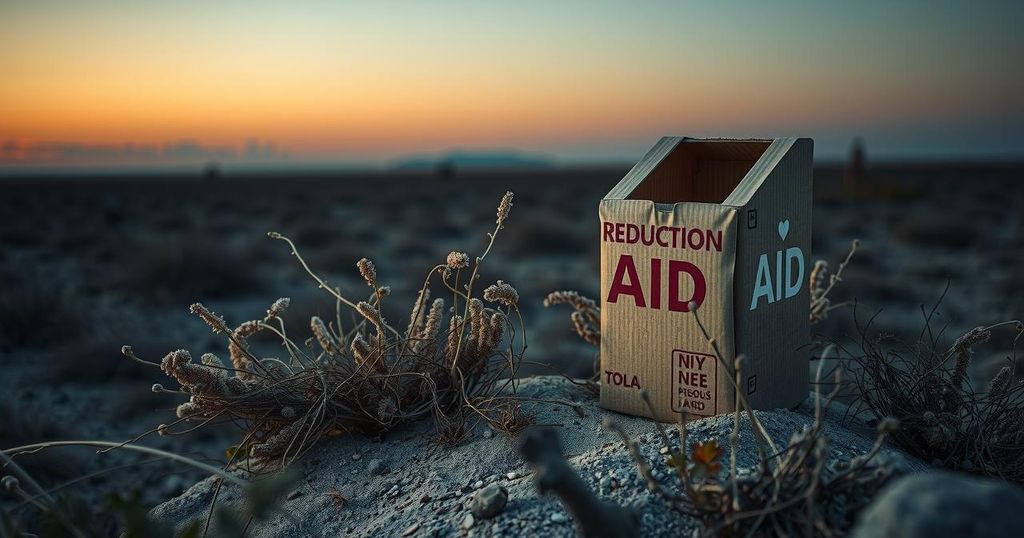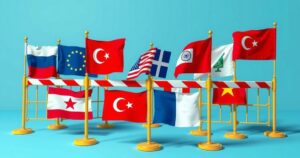Impact of Trump’s USAID Cuts on Sudan’s Crisis and Global Aid

The article discusses the significant impact of the Trump administration’s freeze on USAID operations, highlighting the struggles of Sudanese communities amid ongoing military conflicts and climate crises. Activist Nisreen Elsaim expresses concerns over the cessation of food and health support, emphasizing the long-term consequences of these policies on global well-being and climate change. The need for a united approach and historical responsibility is underscored throughout the discussion.
In 1961, President John F. Kennedy established the United States Agency for International Development (USAID) to support American soft power during the Cold War. The agency provided vital resources such as healthcare, nutrition, infrastructure, and education programs to war-torn and famine-stricken regions, creating a lifeline for millions. However, under the Trump administration, a freeze on foreign assistance and drastic staff layoffs have wreaked havoc on USAID’s crucial initiatives.
Nisreen Elsaim, a Sudanese climate activist, experienced the dire need for aid firsthand after fleeing Khartoum amid recent military conflicts. Extreme climate conditions, exacerbated by droughts and floods, have intensified a humanitarian crisis, leading the United Nations to report that over half of Sudan’s population faces acute hunger. USAID’s shutdown has severely affected community kitchens that rely on its support for sustenance.
The disruption of aid extends beyond food to critical health services, as routine support for medical practices and hygiene has halted. USAID was instrumental in providing therapeutic services for sexual assault victims and psychological aid for those traumatized by violence and war. With its support now vanished, organizations like Female Guardians of the Revolution are left struggling to support nearly 10,000 war victims with less than adequate resources.
The anticipated interruption of Ramadan aid, traditionally provided through food packages supported by USAID, poses additional difficulties. As community organizations scramble to find alternatives, many will be unable to provide essential Ramadan supplies on short notice, resulting in compounded hardships for families in need.
Elsaim underscores that the crisis is amplified by the broader implications of climate change and political negligence, such as Trump’s withdrawal from the Paris Agreement. Climate change transcends national borders, demanding collective action for solutions. The impacts of Trump’s policies, including climate denial, may carry long-term consequences that could destabilize both the U.S. and international systems for years to come.
This situation demands more than just financial contributions; it requires a moral imperative from the American people, acknowledging their nation’s historical responsibilities in addressing global climate change. The obligation to support developing nations is not merely a matter of charity, but rather a crucial ethical responsibility to mitigate the effects of climate change rooted in historical U.S. emissions.
Elsaim asserts that a dependable global aid strategy must be reinstated to foster democracy and health worldwide. “If you want a peaceful world, then you have to work for peace… Some things don’t really know boundaries, and it will catch you wherever you are.” She emphasizes that American actions resonate globally and require a proactive approach to international aid and environmental stewardship.
The cessation of USAID’s operations creates a humanitarian crisis in Sudan, impacting food security, health, and mental health support, and leaving vulnerable populations without crucial resources. The long-term ramifications of Trump’s policies could cripple international aid and exacerbate the effects of climate change, highlighting the need for a renewed commitment to global responsibility and collaboration. Elsaim’s call to action underscores that the U.S. must take proactive steps to address these challenges, emphasizing that the health and safety of all are interconnected.
Original Source: insideclimatenews.org





